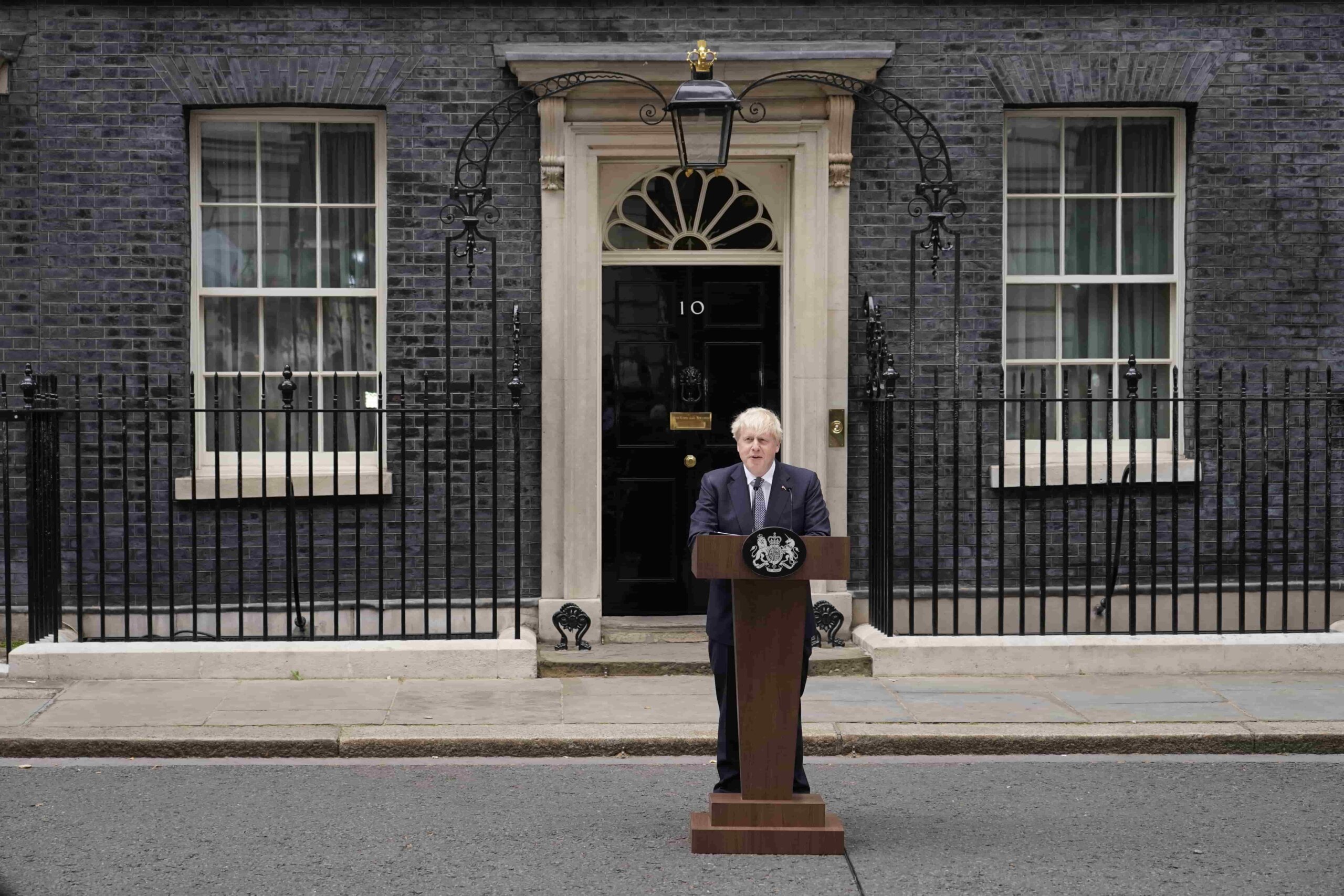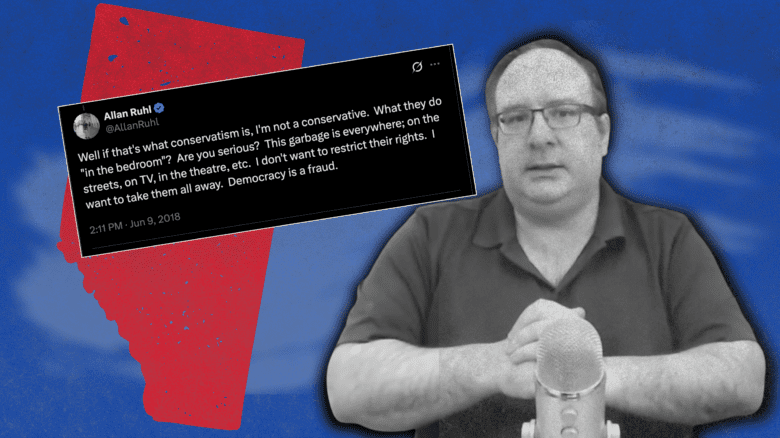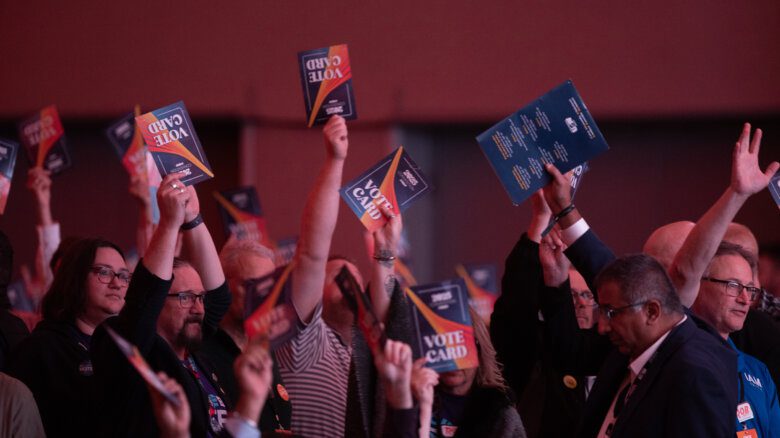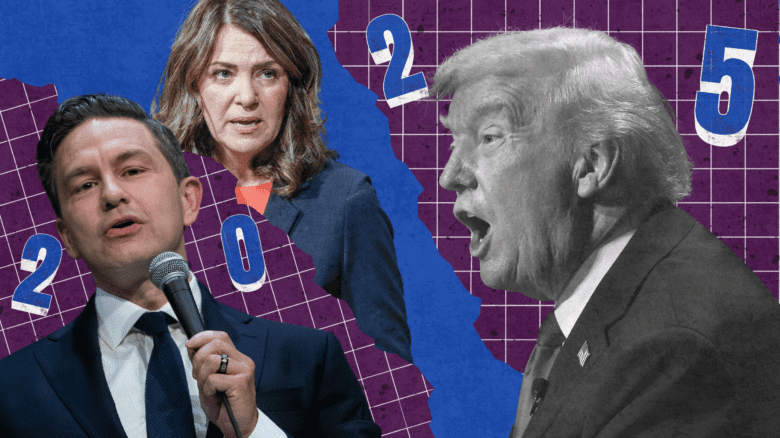It’s a race to the bottom as the United Kingdom works to select a successor to its soon-to-be-booted conservative prime minister, Boris Johnson. In the wake of Johnson’s July 7 resignation, the Tory leadership contest has devolved into a transphobic nightmare—with candidates attempting to one-up each other on opposing basic equality for trans Britons.
Following the fifth round of voting from British MPs on July 20, just two candidates remain in the race: former Chancellor of the Exchequer Rishi Sunak and Minister for Women and Equalities Liz Truss. Minister of State for Trade Policy Penny Mordaunt was eliminated on Wednesday as the final MP votes were cast. Sunak, the current frontrunner, secured 137 votes from conservative lawmakers in the fifth round, while Truss earned 113. Mordaunt trailed in last place with 105, eliminating her from contention. The top two vote-getters will now head to a runoff in which around 180,000 general members of the Conservative Party from across the U.K. will vote to decide the country’s next leader.
Truss is believed to be a dark-horse favourite after making up significant ground between the third and fourth rounds, gaining 15 votes from her Tory colleagues as other hopefuls fell out of contention. With former junior equalities minister Kemi Badenoch knocked out of the contest during the fourth round on Tuesday, Truss again gained significant ground on Sunak in the final tally—earning 27 additional ballots, as compared to just 19 for Sunak.
Either of these outcomes would be a disaster for trans rights in the U.K., which have already been under significant threat during Johnson’s two years in office. Sunak, who would be Britain’s first South Asian PM, has perhaps the least paper trail on trans rights among remaining aspirants. An “ally” of his campaign told the U.K. newspaper Daily Mail in July, however, that Sunak opposes the alleged erasure of women “via the use of clumsy, gender-neutral language” and that he plans to “call on schools to be more careful in how they teach on issues of sex and gender.”
Although those remarks did not come directly from Sunak and were attributed anonymously, he tweeted the Daily Mail story shortly after launching his campaign. In the July 10 post, Sunak vowed to “protect women’s rights and ensure women and girls enjoy the same freedom most males take for granted in feeling safe from assault and abuse” if chosen to be PM.
If I become Prime Minister I will protect women’s rights and ensure women and girls enjoy the same freedom most males take for granted in feeling safe from assault and abuse.
Read more below #Ready4Rishi https://t.co/3cXn1rFhca👇
https://t.co/h7mlKHV97M— Rishi Sunak (@RishiSunak) July 10, 2022
In an April Q&A held prior to his PM bid, Sunak also hinted at support for policies that could restrict trans restroom access and claimed that trans women should not compete against other female athletes in sports. “I think biology is critically important as we think about some of the very practical functions, like toilets or sports,” Sunak said at the time.
Truss, the second place finisher in Wednesday’s vote, would likely be even worse for trans people. The reigning equalities minister has assisted in the wholesale roll back of trans rights under Johnson’s tenure, gutting planned reforms to the Gender Recognition Act (GRA) in 2020 that would make it easier for trans Britons to correct their legal gender. She has vocally opposed self-ID, saying on several occasions that there should be “checks and balances in the system,” and pushed the U.K. government to withdraw from a diversity program operated by British LGBTQ+ advocacy group Stonewall in April 2021 over the organization’s vocal support for trans equality.
These positions have resulted in a major clash with supporters of the LGBTQ+ community. Last year, Truss confirmed that the reason the U.K. government’s LGBT Advisory Panel was dissolved in March 2021 was because she had a “fundamental disagreement” with its members regarding whether trans people should have the right to determine their gender for themselves.
Even aside from the backgrounds of these two candidates, transphobia has been a major factor in the PM race. Mordaunt, who served as equalities minister under former PM Theresa May, was initially perceived as the strongest ally to the LGBTQ+ community in the Tory leadership race but has been forced to walk back her formerly pro-trans views in recent weeks. Although Mordaunt told the British queer outlet PinkNews in 2018 that she believes “trans men are men and trans women are women,” she backpedalled in a July 9 tweet-storm in which she accused her rivals of wanting to portray her as “woke” in order to “damage [her] reputation.”
“I am biologically a woman,” she tweeted. “If I have a hysterectomy or mastectomy, I am still a woman. And I am legally a woman. Some people born male and who have been through the gender recognition process are also legally female. That does not mean they are biological women, like me.”
In the 10-tweet thread, Mordaunt claimed that she “challenged the trans orthodoxy with real and genuine concern” during the year she spent as equalities minister. She posted screenshots of 2018 news stories in The Times and the Daily Mail in which she discussed ordering an investigation into the alleged influx of U.K. trans youth being referred to gender clinics. Mordaunt also wrote that she has opposed the use of gender-neutral language to refer to expectant parents and said she supports a “science-based approach” to trans sports participation, adding that “biology is overwhelming [sic] important” in determining athletics access.
“I’ve fought for women’s rights all my life,” Mordaunt said. “I would never do anything to undermine them. I will continue to protect them.”
But despite her attempt to portray herself as critical of trans rights, opponents even further to the right of Mordaunt repeatedly attacked her work on LGBTQ+ equality throughout the race. During a contentious televised debate held on July 15, Badenoch accused Mordaunt of supporting the right of trans people to legally determine their gender identity without medical approval—a stance commonly referred to by trans advocates as “self-ID.” As a former member of the equalities bureau herself, Badenoch said this was the policy pushed by the office’s predecessors within the May administration; she suggested that Mordaunt was directly responsible.
“So, I don’t understand how that would have changed unless someone else did it in between,” said Badenoch, who recently claimed in a July op-ed for The Times that identity-based politics serves to impose “coercive control,” “the imposition of views” and “the shutting down of debate.”
The transphobic smears against Mordaunt appear to have worked. Although a poll conducted by Reuters originally showed her to be the clear favourite among grassroots conservative party members in the PM race—besting her closest rival by a near 2-1 margin—recent surveys have been less favourable. In a YouGov poll released July 19, Mordaunt trailed Truss by six points, and even Badenoch beat her by five. Although Mordaunt was once the odds-on pick by bookmakers, Truss is now in the lead with Mordaunt out of the running; she narrowly edges out Sunak on betting sites.
It’s unclear who will ultimately emerge victorious in the British PM race, but the outcome probably won’t change the U.K.’s downward spiral when it comes to trans rights. Johnson, who was forced to step down from Tory leadership earlier this month following a string of scandals, was no friend to the LGBTQ+ community. In June, he backed a decision by the swimming governing body Fina to ban trans female athletes who had gone through endogenous puberty from competing in women’s sports and claimed that women don’t have penises. Last October, he commended the “incredible hard work” of the LGB Alliance—a lobby group that believes trans rights is antithetical to queer liberation.
Johnson’s administration also excluded trans people from the country’s long-sought conversion therapy ban, which elicited widespread condemnation among LGBTQ+ advocates. Thousands of people took to the streets in April to protest the decision—which could also include generous carve-outs for religious practitioners who conduct “pray the gay away” treatments.
Fortunately, polls show the British public remain more supportive of trans rights than anyone currently running to lead the country. An April survey from YouGov found that nearly two-thirds of Britons (65 percent) believe a conversion therapy ban should also include attempts to “change” an individual’s gender identity, and a poll from the More in Common think tank released in June showed that the largest number of respondents (46 percent) said the gender identities of trans people are valid.


 Why you can trust Xtra
Why you can trust Xtra


